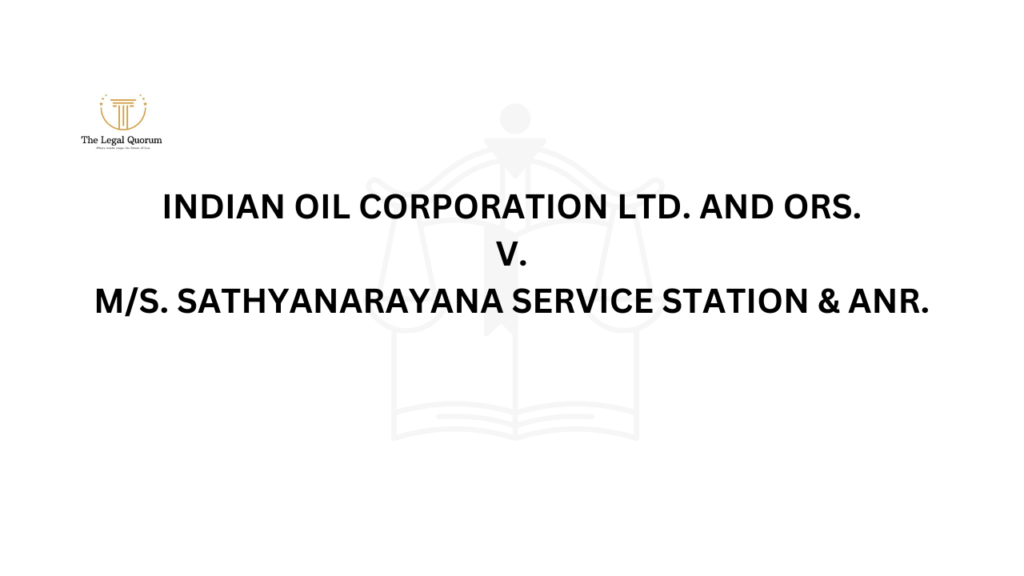Published On: 3rd September, 2024
Authored By: Parigha Paygude
VPM’S TMC Law College, Thane
In the Supreme Court of India
Petitioner:
Seth Mohan Lal & Anr.
Respondent:
Grain Chmaber Ltd., Muzaffarnagar & Ors.
Date of Judgement:
15 November, 1967
Bench:
Shah, J.C.
Facts:
– The company was involved in “futures” trading in gur (a type of sugar).
– Transactions involved standardized units called ‘Bijaks’.
– Disputes arose over transactions made during a period when the legality of such transactions was questioned due to governmental regulations.
– Appellants claimed transactions were authorized under an invalid board resolution due to director disqualification.
– Issues included financial mismanagement and claims of the company being unable to pay its debts.
– Appellants sought winding up of the company on grounds of inability to continue business.
Issues:
- Did the resolution passed by the Board of Directors on March 14, 1949, authorizing transactions in “futures” in gur, constitute a valid basis for the company’s subsequent actions?
- Were the transactions entered into by Seth Mohan Lal and Company in “futures” in gur, including those claimed to be in benami names, legally enforceable under the circumstances?
- Did the governmental notification amending the Sugar (Futures and Options) Prohibition Order, 1949, render all prior transactions void and impact the company’s contractual obligations?
- Was the company unable to pay its debts, and if so, does this inability justify the winding up of the company?
- Did the directors of the company engage in fraudulent acts or misappropriation of funds, thereby justifying the winding up of the company on grounds of mismanagement?
- Has the substratum of the company ceased to exist due to the destruction of its business, providing a just and equitable ground for winding up?
- Were any of the directors disqualified under the Indian Companies Act, 1913, thereby invalidating the resolutions passed and the transactions undertaken?
- Did the actions of the company in settling claims with other parties instead of Seth Mohan Lal and Company amount to unfair treatment and provide grounds for winding up?
- Were the petitioners entitled to recover amounts as creditors, and if so, were these debts genuinely disputed by the company in good faith?
Rules of law:
- Section 86F of the Indian Companies Act, 1913: Prohibits directors from voting on any contract or arrangement in which they are directly or indirectly concerned or interested, unless consented to by the board of directors. A director’s vote in such cases shall not be counted towards forming a quorum.
- Section 91B of the Indian Companies Act, 1913: Further reinforces the prohibition against directors voting on contracts or arrangements in which they have a personal interest. Their presence also does not count towards quorum if they are concerned or interested in the contract.
- Regulation 94 of Table A: While not mandatory under the Act, it may be deemed incorporated into the Articles of Association of a company if not excluded or modified by the company’s specific articles. It provides certain guidelines and regulations concerning directorial actions and resolutions.
- Validity of Resolutions: Resolutions passed by directors, such as the one on March 14, 1949, authorizing business in “futures” in gur, are scrutinized for compliance with statutory provisions and internal regulations. The resolution’s validity may depend on whether it adheres to the requirements of Sections 86F and 91B and any applicable company regulations.
- Protection of Acts Done: There may be considerations regarding the protection of acts done by directors, even if subsequently found to be disqualified under Section 86F. This involves examining whether the directors were aware of their disqualification and whether the company suffered any detriment because of their actions.
- General vs Specific Consent: The judgment hints at a distinction between general and specific consent by directors for entering contracts with the company. Specific consent may be required for each contract to avoid violating Section 86F’s prohibitions.
Analysis:
- Validity of the Resolution on Futures Trading in Gur
The resolution passed by the Board of Directors on March 14, 1949, authorizing transactions in “futures” in gur, must adhere to Sections 86F and 91B of the Indian Companies Act, 1913. These sections prohibit directors from voting on contracts in which they have a personal interest without obtaining consent and exclude their votes from forming a quorum. If the directors involved in authorizing futures trading in gur were directly or indirectly interested in these transactions and did not comply with these statutory requirements, the resolution could be considered invalid. This would raise questions about the legality and enforceability of subsequent actions taken by the company based on this resolution.
2. Legality of Transactions in Futures by Seth Mohan Lal and Company
Transactions in futures by Seth Mohan Lal and Company, especially those conducted under benami names, are subject to scrutiny for legal enforceability. According to general contract law principles, transactions must be entered into without fraud or misrepresentation to be enforceable. If the transactions were found to be fraudulent or involved misrepresentation, they may be voidable. Similarly, benami transactions, where the names of third parties were used without intention to benefit them, typically lack enforceability unless a beneficial interest for the real owner can be proven. Therefore, the legal enforceability of these transactions would depend on evidence regarding the circumstances under which they were conducted.
3. Impact of Governmental Notification on Sugar Futures
The governmental notification amending the Sugar (Futures and Options) Prohibition Order, 1949, would impact the legal status of prior transactions in sugar futures. Legislative changes can have retroactive or prospective effects on contracts. If the notification explicitly rendered prior transactions void or modified the legal framework under which such transactions were conducted, it would affect the company’s contractual obligations. However, unless specified otherwise, existing contracts generally remain valid unless directly invalidated by subsequent legislation. Therefore, the precise terms and retroactive application of the notification would determine its impact on the company’s contractual rights and obligations.
4. Grounds for Winding Up Due to Inability to Pay Debts
The company’s inability to pay its debts as they fall due constitutes grounds for winding up under company law. This criterion focuses on whether the company is insolvent and unable to meet its financial obligations. Courts assess the company’s financial position and the evidence of its inability to pay debts before determining whether winding up is justified. While the law provides for winding up in cases of insolvency, courts also consider alternatives to winding up if feasible, emphasizing the necessity to establish clear evidence of financial distress.
5. Mismanagement and Fraudulent Acts by Directors
Allegations of mismanagement and fraudulent acts by directors may justify winding up the company on grounds of prejudicial conduct. Mismanagement refers to actions by directors that harm the company’s interests, while fraud involves deliberate misrepresentation or deceit. Courts scrutinize the directors’ conduct and its impact on the company to determine if winding up is warranted. The threshold for ordering winding up based on mismanagement or fraud is high, requiring substantial evidence of significant harm to the company or its stakeholders. Therefore, the court would need to carefully evaluate the allegations, the directors’ responsibilities, and the resulting impact on the company before deciding on this ground.
Conclusion:
In adjudicating the case of Seth Mohan Lal and Company, the court meticulously deliberated on multiple legal issues arising from the company’s involvement in futures trading of gur and the subsequent disputes. The crux of the case revolved around the validity of the board resolution authorizing these transactions, compliance with regulatory frameworks, enforceability of transactions conducted, and the company’s financial stability.
Firstly, the court assessed the validity of the board resolution passed on March 14, 1949, permitting futures trading in gur. It applied Sections 86F and 91B of the Indian Companies Act, 1913, which restrict directors from voting on matters in which they have a personal interest without proper consent. The resolution’s validity was contingent on adherence to these provisions, crucial for determining the legality of subsequent actions by the company.
Secondly, the enforceability of transactions, especially those purportedly conducted in benami names, was scrutinized. The court applied general contract law principles, emphasizing that transactions must be free from fraud and misrepresentation to be enforceable. The burden of proof rested on demonstrating the beneficial ownership in benami transactions for their validation.
The impact of a governmental notification amending the Sugar (Futures and Options) Prohibition Order, 1949, was also pivotal. The court evaluated whether this notification retroactively rendered prior transactions void or modified the legal landscape under which the transactions were executed. This scrutiny was essential to ascertain the company’s contractual obligations post-notification.Regarding the company’s financial status, the court examined whether there was evidence of an inability to pay debts as they became due, a critical factor under company law for justifying winding up. The determination of insolvency and financial distress relied on factual evidence presented during the proceedings.
Moreover, allegations of mismanagement and fraudulent acts by directors were weighed in the decision-making process. The court assessed whether these actions substantiated claims of prejudicial conduct justifying winding up. The severity of these allegations and their impact on the company’s operations and stakeholders guided the court’s deliberation.
In conclusion, the court rendered a judgment that balanced legal principles with factual evidence presented. It adjudicated on the validity of the board resolution, enforceability of transactions, impact of regulatory changes, financial stability of the company, and allegations of mismanagement and fraud. The decision reflected a comprehensive analysis of each issue within the framework of Indian company law, aiming to uphold justice and equity in resolving the complex disputes brought forth by the parties involved.




